Unit 4 Don't eat in class. Section A(2d-3c)课件(共35张PPT)
文档属性
| 名称 | Unit 4 Don't eat in class. Section A(2d-3c)课件(共35张PPT) | 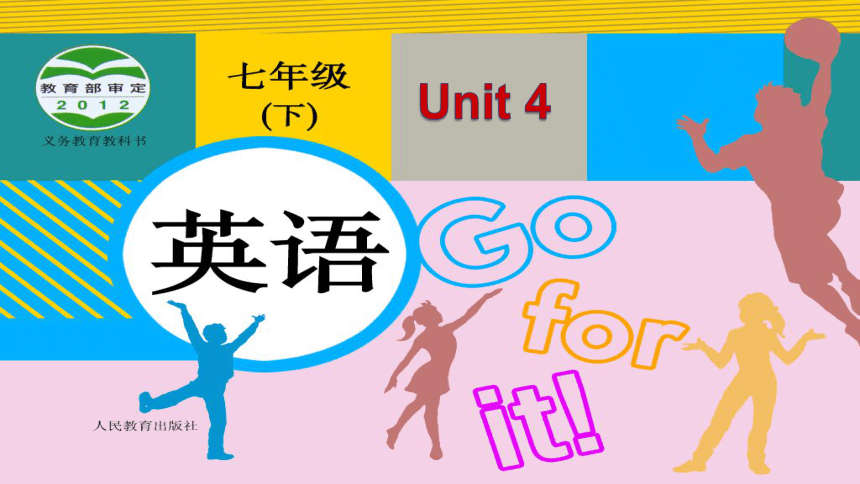 | |
| 格式 | zip | ||
| 文件大小 | 2.7MB | ||
| 资源类型 | 教案 | ||
| 版本资源 | 人教新目标(Go for it)版 | ||
| 科目 | 英语 | ||
| 更新时间 | 2022-03-23 18:09:00 | ||
图片预览


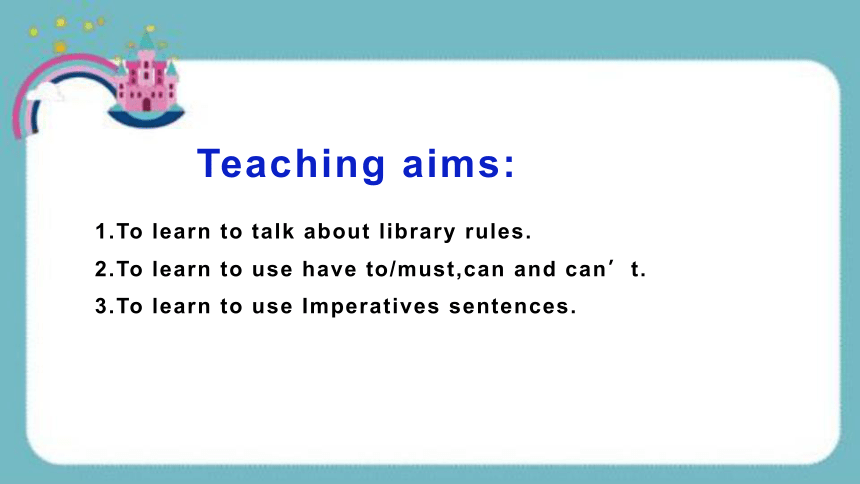
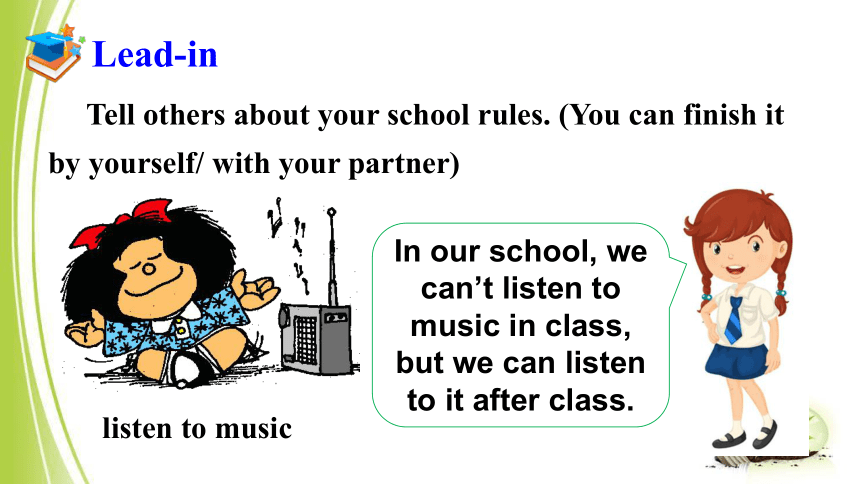

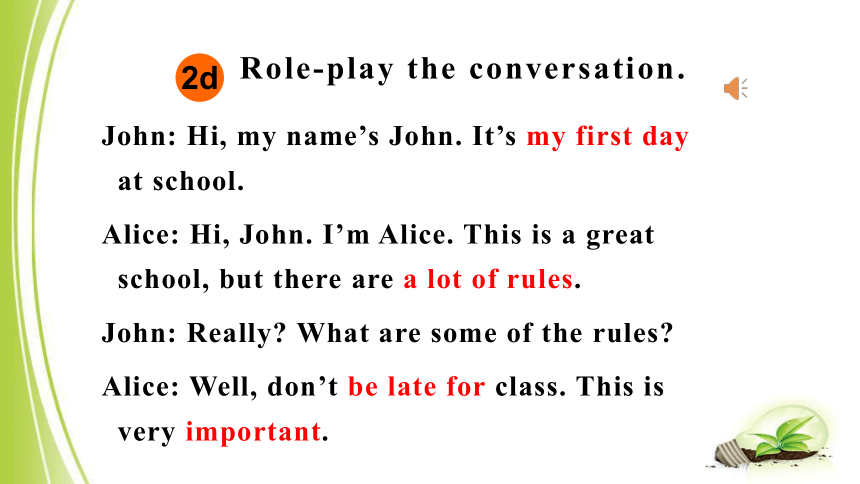
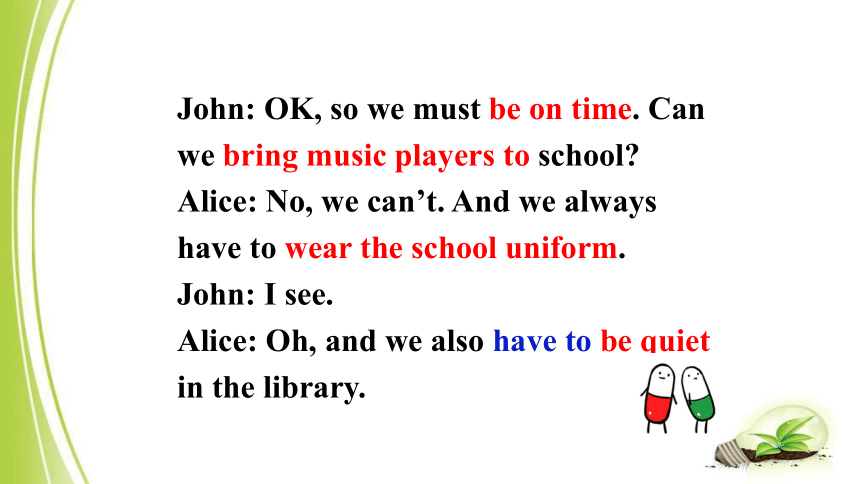

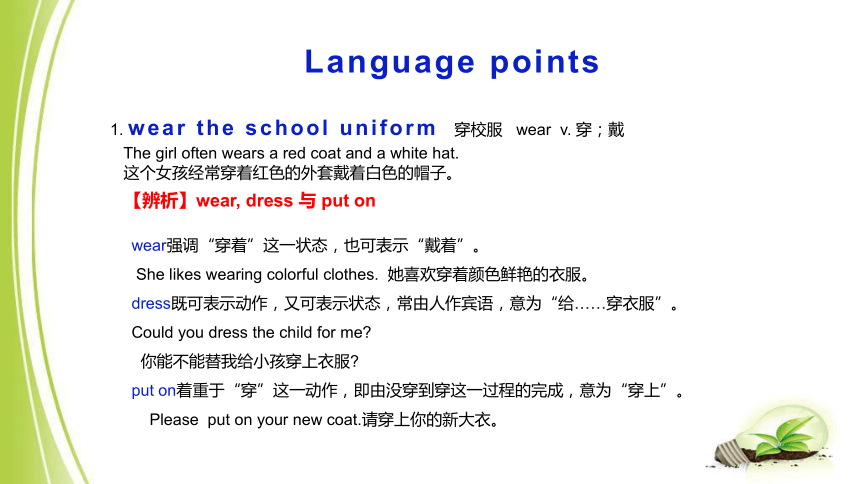
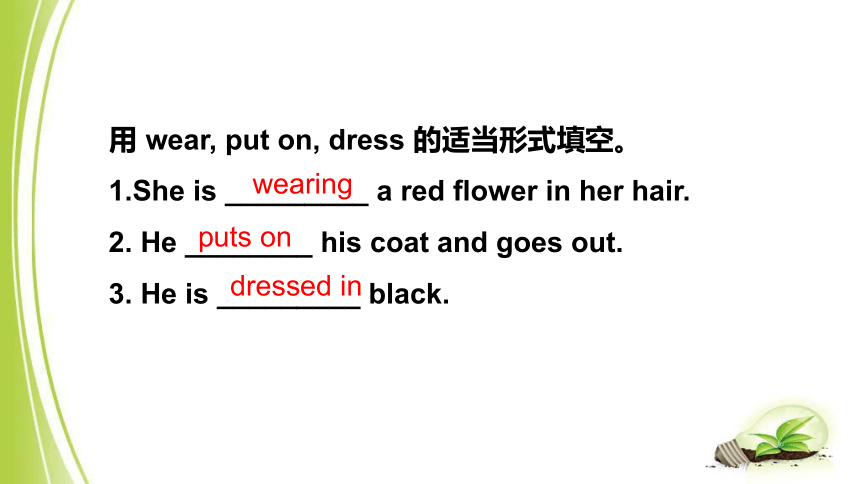
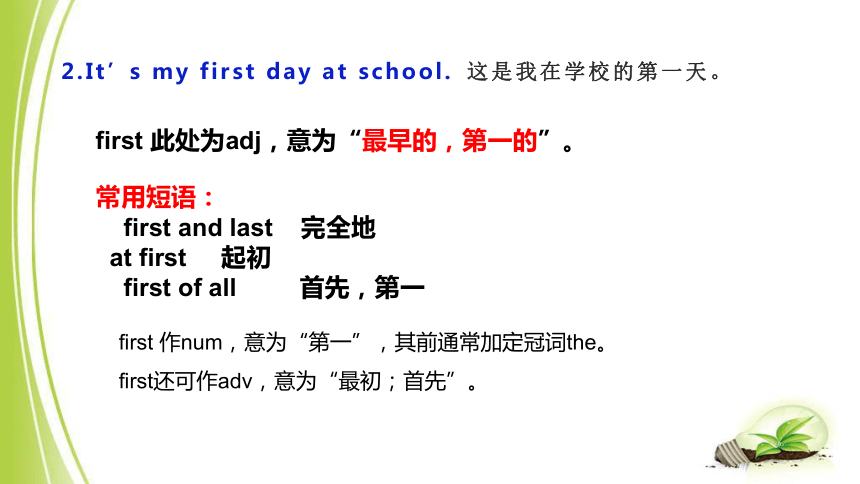

文档简介
(共35张PPT)
Unit 4
Section A (2d-3c)
Unit 4 Don't eat in class.
Teaching aims:
1.To learn to talk about library rules.
2.To learn to use have to/must,can and can’t.
3.To learn to use Imperatives sentences.
Lead-in
Tell others about your school rules. (You can finish it by yourself/ with your partner)
listen to music
In our school, we can’t listen to music in class, but we can listen to it after class.
In our school, we can’t listen to music in class, but we can listen to it after class.
What are the rules in your school
Role-play
Role-play the conversation.
John: Hi, my name’s John. It’s my first day at school.
Alice: Hi, John. I’m Alice. This is a great school, but there are a lot of rules.
John: Really What are some of the rules
Alice: Well, don’t be late for class. This is very important.
2d
John: OK, so we must be on time. Can we bring music players to school
Alice: No, we can’t. And we always have to wear the school uniform.
John: I see.
Alice: Oh, and we also have to be quiet in the library.
Practice
Can we …
Yes ,we can .
No, we can’t.
eat in class
listen to music outside
wear hats in school
fight in class
speak loudly in the library
Language points
1. wear the school uniform 穿校服 wear v. 穿;戴
The girl often wears a red coat and a white hat.
这个女孩经常穿着红色的外套戴着白色的帽子。
【辨析】wear, dress 与 put on
wear强调“穿着”这一状态,也可表示“戴着”。
She likes wearing colorful clothes. 她喜欢穿着颜色鲜艳的衣服。
dress既可表示动作,又可表示状态,常由人作宾语,意为“给……穿衣服”。
Could you dress the child for me
你能不能替我给小孩穿上衣服
put on着重于“穿”这一动作,即由没穿到穿这一过程的完成,意为“穿上”。
Please put on your new coat.请穿上你的新大衣。
用 wear, put on, dress 的适当形式填空。
1.She is _________ a red flower in her hair.
2. He ________ his coat and goes out.
3. He is _________ black.
wearing
puts on
dressed in
2.It’s my first day at school. 这是我在学校的第一天。
first 此处为adj,意为“最早的,第一的”。
常用短语:
first and last 完全地
at first 起初
first of all 首先,第一
first 作num,意为“第一”,其前通常加定冠词the。
first还可作adv,意为“最初;首先”。
3.Can we bring music players to school
我们能把音乐播放机带到学校来吗?
bring v. 带来;取来
Can you bring me an English dictionary 你能给我带来一本英语词典吗?
注意:
bring 指带来,take指带走。
Bring your homework here, and take the book away.
把你的作业拿过来,把这本书带走。
---Why do Chinese people like red
---Because they think it can ____ them good luck.
A. carry B. bring C. make D. take
B
Don’t run in the hallways. Don’t fight.
What are the rules We must be on time for class.
Can we eat in the classroom No, we can’t, but we can eat in the dining hall.
Can we wear a hat in class Yes, we can. / No, we can’t.
Does he have to wear a uniform at school Yes, he does. / No, he doesn’t.
What do you have to do We have to be quiet in the library.
Grammar Focus
1.祈使句的肯定句通常是以动词原形开头。否定句在动词原形前加don't.
2.can,must,have to 后接动词原形。
3.can表能够,允许,have to 表不得不,必须, must 表示必须
祈使句的用法
1.祈使句的概念
(1)祈使句是指用来表示请求、命令、叮嘱、
建议等的句子。祈使句没有主语,谓语动词
用原形,句末使用感叹号或者句号。
例:站起来!
一定要准时。
(命令)
(叮嘱)
Stand up!
Be sure to be on time.
(2)如果祈使句表示客气地请求,一般要加上please。
please可以放在句子前面也可以放在句子的后面。
例: 请跟我读。
Please read after me.
(请求)
= Read after me, please.
2.祈使句的形式
(1)let开头的祈使句的肯定句:Let + sb.+ v.(原形)
例: 让我们帮助你。
Don’t let them come in.
Let us help you.
否定为:Don’t + let + 第三人称代词+v.(原形)
例: 不要让他们进来。
(2)非let开头的祈使句的肯定句和否定句:
肯定句
Do 型
Be 型
v.原形(+宾语)+其他成份.
Be+表语(名词或形容词)+其他成份.
例:Listen to me, please.
例:Be quiet, please.
请听我说。
请安静。
否定句
Don’t +行为动词 +其他.
Don’t + be +其他.
No + n./v.-ing.
例: Don’t play computer games.
例: Don’t be late again.
例: No photos.
No swimming.
不要玩电脑游戏。
不要再迟到。
不许拍照。
不许游泳。
3.祈使句的用法
主语是you常省去,动词原形开头记。
否定形式要注意,句首要把don’t加。
要讲客气用please, 句首、句末没关系。
情态动词must与have to
1.情态动词must的用法
(1)表示有做某一个动作的必要和义务,它的意思
是“必须、应该”。
例:你必须做你的作业。
You must do your homework.
(2)表示有很大把握的判断或者推测,它的意思是
“一定、准是”。
例:那个高个子男人一定是你的爸爸。
The tall man must be your father.
(3)以must开头的一般疑问句,它的否定回答用
needn’t (不必要),不用mustn’t(不允许) ,mustn’t
常用于否定句中,表示“不允许,禁止”。
例:你的车不允许停在这儿。
You mustn’t park your car here.
2.情态动词have to的用法
have to表示客观需要做的事情,意思是“必须,
不得不”。
(1)have to后接动词原形,意为“必须做……;不
得不做……”。
例: 我不得不离开了。
I have to leave.
(2)have to有人称、数和时态的变化,其第三人称
单数形式为has to。
例: 她不得不做作业。
She has to do her homework.
(3)含有have to, has to的句子变疑问句或否定句需
分别借助助动词do, does 。
例: 他们必须早起吗?
Do they have to get up early
Write the rules for the school library.
Library Rules
1.
2.
3.
4.
Don’t talk.
Don’t eat.
Don’t listen to music.
Don’t take photos.
3a
Use the words to make questions about the rules. Then write answers according
to your school.
Be quiet
Q: Does she have to be quiet in the library
(she/have to/in the library)
A: Yes, she does.
Eat
Q: ___________________________________________________________________________________________
(he/have to/in the dining hall)
A: __________________
Does he have to eat in the dining hall
Yes, he does.
3b
Listen to music
Q: ___________________________________________________________________________________________
(we/can/in the hallways)
A: __________________
Wear a hat
Q: ___________________________________________________________________________________________
(we/can/in the classroom)
A: __________________
Can we listen to music in the hallways
No, we can’t.
Can we wear a hat in the classroom
No, we can’t.
1. We can eat in class.
2. We don’t have to come to
school every day.
3. …
Make up five cool rules for your dream school. Share your rules with the class. Your classmates vote for the Coolest School!
At my dream school, we don’t have to come to school every day. We …
3c
根据句意,用can和can’t填空。
1. Mr Green_______ smoke here because there’s a sign on the wall. It says “No smoking.”
2. It’s very hot outside. You______ wear a hat.
can’t
can
3. We _______ eat in the classroom because it’s impolite to teachers.
4. I ______ go to bed after 11:00 on school night.
5. The students _____ read books and magazines in the library.
can’t
can
can’t
用have to或has to填空。
1.We ________ clean our classroom after school.
2.She _________ make her bed after getting up.
3.It’s late. Mr Beckman ______ go to work by car.
4.Emily and Peter join a music club. They _______ practice the guitar every day.
have to
have to
has to
has to
1. He has to eat breakfast quickly. (改为一般疑问句)
__________________________________
2. Play volleyball after class. (改为否定句)
________________________________
句型转换
Does he have to eat breakfast quickly
Don’t play volleyball after class.
练习坊
3. We can wear sports shoes in class. (改为一般疑问) ______________________________
4. Don’t arrive late for class. (改为同义句)
_______________________________
5. Eric has to do his homework before six. (对划线部分提问)
___________________________________
Can we wear sports shoes in class
We must be on time for class.
What does Eric have to do before six
Unit 4
Section A (2d-3c)
Unit 4 Don't eat in class.
Teaching aims:
1.To learn to talk about library rules.
2.To learn to use have to/must,can and can’t.
3.To learn to use Imperatives sentences.
Lead-in
Tell others about your school rules. (You can finish it by yourself/ with your partner)
listen to music
In our school, we can’t listen to music in class, but we can listen to it after class.
In our school, we can’t listen to music in class, but we can listen to it after class.
What are the rules in your school
Role-play
Role-play the conversation.
John: Hi, my name’s John. It’s my first day at school.
Alice: Hi, John. I’m Alice. This is a great school, but there are a lot of rules.
John: Really What are some of the rules
Alice: Well, don’t be late for class. This is very important.
2d
John: OK, so we must be on time. Can we bring music players to school
Alice: No, we can’t. And we always have to wear the school uniform.
John: I see.
Alice: Oh, and we also have to be quiet in the library.
Practice
Can we …
Yes ,we can .
No, we can’t.
eat in class
listen to music outside
wear hats in school
fight in class
speak loudly in the library
Language points
1. wear the school uniform 穿校服 wear v. 穿;戴
The girl often wears a red coat and a white hat.
这个女孩经常穿着红色的外套戴着白色的帽子。
【辨析】wear, dress 与 put on
wear强调“穿着”这一状态,也可表示“戴着”。
She likes wearing colorful clothes. 她喜欢穿着颜色鲜艳的衣服。
dress既可表示动作,又可表示状态,常由人作宾语,意为“给……穿衣服”。
Could you dress the child for me
你能不能替我给小孩穿上衣服
put on着重于“穿”这一动作,即由没穿到穿这一过程的完成,意为“穿上”。
Please put on your new coat.请穿上你的新大衣。
用 wear, put on, dress 的适当形式填空。
1.She is _________ a red flower in her hair.
2. He ________ his coat and goes out.
3. He is _________ black.
wearing
puts on
dressed in
2.It’s my first day at school. 这是我在学校的第一天。
first 此处为adj,意为“最早的,第一的”。
常用短语:
first and last 完全地
at first 起初
first of all 首先,第一
first 作num,意为“第一”,其前通常加定冠词the。
first还可作adv,意为“最初;首先”。
3.Can we bring music players to school
我们能把音乐播放机带到学校来吗?
bring v. 带来;取来
Can you bring me an English dictionary 你能给我带来一本英语词典吗?
注意:
bring 指带来,take指带走。
Bring your homework here, and take the book away.
把你的作业拿过来,把这本书带走。
---Why do Chinese people like red
---Because they think it can ____ them good luck.
A. carry B. bring C. make D. take
B
Don’t run in the hallways. Don’t fight.
What are the rules We must be on time for class.
Can we eat in the classroom No, we can’t, but we can eat in the dining hall.
Can we wear a hat in class Yes, we can. / No, we can’t.
Does he have to wear a uniform at school Yes, he does. / No, he doesn’t.
What do you have to do We have to be quiet in the library.
Grammar Focus
1.祈使句的肯定句通常是以动词原形开头。否定句在动词原形前加don't.
2.can,must,have to 后接动词原形。
3.can表能够,允许,have to 表不得不,必须, must 表示必须
祈使句的用法
1.祈使句的概念
(1)祈使句是指用来表示请求、命令、叮嘱、
建议等的句子。祈使句没有主语,谓语动词
用原形,句末使用感叹号或者句号。
例:站起来!
一定要准时。
(命令)
(叮嘱)
Stand up!
Be sure to be on time.
(2)如果祈使句表示客气地请求,一般要加上please。
please可以放在句子前面也可以放在句子的后面。
例: 请跟我读。
Please read after me.
(请求)
= Read after me, please.
2.祈使句的形式
(1)let开头的祈使句的肯定句:Let + sb.+ v.(原形)
例: 让我们帮助你。
Don’t let them come in.
Let us help you.
否定为:Don’t + let + 第三人称代词+v.(原形)
例: 不要让他们进来。
(2)非let开头的祈使句的肯定句和否定句:
肯定句
Do 型
Be 型
v.原形(+宾语)+其他成份.
Be+表语(名词或形容词)+其他成份.
例:Listen to me, please.
例:Be quiet, please.
请听我说。
请安静。
否定句
Don’t +行为动词 +其他.
Don’t + be +其他.
No + n./v.-ing.
例: Don’t play computer games.
例: Don’t be late again.
例: No photos.
No swimming.
不要玩电脑游戏。
不要再迟到。
不许拍照。
不许游泳。
3.祈使句的用法
主语是you常省去,动词原形开头记。
否定形式要注意,句首要把don’t加。
要讲客气用please, 句首、句末没关系。
情态动词must与have to
1.情态动词must的用法
(1)表示有做某一个动作的必要和义务,它的意思
是“必须、应该”。
例:你必须做你的作业。
You must do your homework.
(2)表示有很大把握的判断或者推测,它的意思是
“一定、准是”。
例:那个高个子男人一定是你的爸爸。
The tall man must be your father.
(3)以must开头的一般疑问句,它的否定回答用
needn’t (不必要),不用mustn’t(不允许) ,mustn’t
常用于否定句中,表示“不允许,禁止”。
例:你的车不允许停在这儿。
You mustn’t park your car here.
2.情态动词have to的用法
have to表示客观需要做的事情,意思是“必须,
不得不”。
(1)have to后接动词原形,意为“必须做……;不
得不做……”。
例: 我不得不离开了。
I have to leave.
(2)have to有人称、数和时态的变化,其第三人称
单数形式为has to。
例: 她不得不做作业。
She has to do her homework.
(3)含有have to, has to的句子变疑问句或否定句需
分别借助助动词do, does 。
例: 他们必须早起吗?
Do they have to get up early
Write the rules for the school library.
Library Rules
1.
2.
3.
4.
Don’t talk.
Don’t eat.
Don’t listen to music.
Don’t take photos.
3a
Use the words to make questions about the rules. Then write answers according
to your school.
Be quiet
Q: Does she have to be quiet in the library
(she/have to/in the library)
A: Yes, she does.
Eat
Q: ___________________________________________________________________________________________
(he/have to/in the dining hall)
A: __________________
Does he have to eat in the dining hall
Yes, he does.
3b
Listen to music
Q: ___________________________________________________________________________________________
(we/can/in the hallways)
A: __________________
Wear a hat
Q: ___________________________________________________________________________________________
(we/can/in the classroom)
A: __________________
Can we listen to music in the hallways
No, we can’t.
Can we wear a hat in the classroom
No, we can’t.
1. We can eat in class.
2. We don’t have to come to
school every day.
3. …
Make up five cool rules for your dream school. Share your rules with the class. Your classmates vote for the Coolest School!
At my dream school, we don’t have to come to school every day. We …
3c
根据句意,用can和can’t填空。
1. Mr Green_______ smoke here because there’s a sign on the wall. It says “No smoking.”
2. It’s very hot outside. You______ wear a hat.
can’t
can
3. We _______ eat in the classroom because it’s impolite to teachers.
4. I ______ go to bed after 11:00 on school night.
5. The students _____ read books and magazines in the library.
can’t
can
can’t
用have to或has to填空。
1.We ________ clean our classroom after school.
2.She _________ make her bed after getting up.
3.It’s late. Mr Beckman ______ go to work by car.
4.Emily and Peter join a music club. They _______ practice the guitar every day.
have to
have to
has to
has to
1. He has to eat breakfast quickly. (改为一般疑问句)
__________________________________
2. Play volleyball after class. (改为否定句)
________________________________
句型转换
Does he have to eat breakfast quickly
Don’t play volleyball after class.
练习坊
3. We can wear sports shoes in class. (改为一般疑问) ______________________________
4. Don’t arrive late for class. (改为同义句)
_______________________________
5. Eric has to do his homework before six. (对划线部分提问)
___________________________________
Can we wear sports shoes in class
We must be on time for class.
What does Eric have to do before six
同课章节目录
- Unit 1 Can you play the guitar?
- Section A
- Section B
- Unit 2 What time do you go to school?
- Section A
- Section B
- Unit 3 How do you get to school?
- Section A
- Section B
- Unit 4 Don't eat in class.
- Section A
- Section B
- Unit 5 Why do you like pandas?
- Section A
- Section B
- Unit 6 I'm watching TV.
- Section A
- Section B
- Review of Units 1-6
- Unit 7 It's raining!
- Section A
- Section B
- Unit 8 Is there a post office near here?
- Section A
- Section B
- Unit 9 What does he look like?
- Section A
- Section B
- Unit 10 I'd like some noodles.
- Section A
- Section B
- Unit 11 How was your school trip?
- Section A
- Section B
- Unit 12 What did you do last weekend?
- Section A
- Section B
